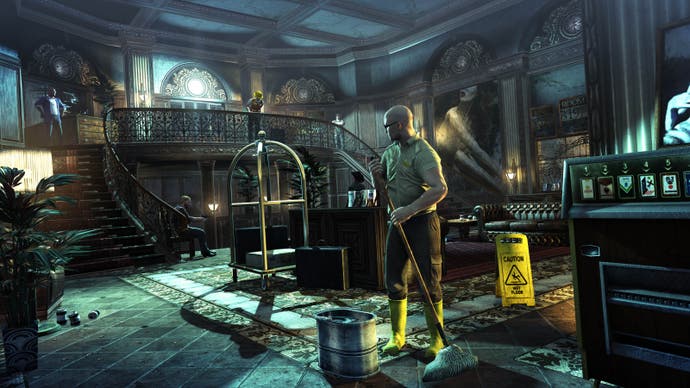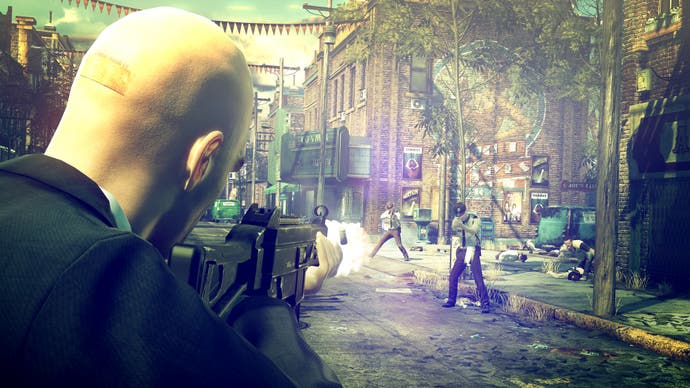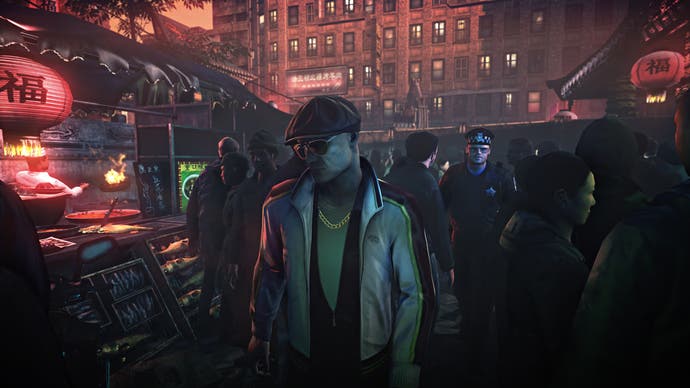Hitman: Absolution review
Brave and bald?
Agent 47 doesn't begin Hitman: Absolution with amnesia, but the six years that have passed since we last took control of him in Blood Money do seem to have dulled his creators' recollections of what made him so popular in the first place. Hitman: Absolution is a slick, responsive and mechanically confident game - and on occasions it's one of the most satisfying stealth games in a year that already includes Dishonored - but a range of compromises to Hitman tradition mean it's still going to rub some people up the wrong way.
Hitman is a simple concept: someone gives you a target, or targets, and you take them out. The genius of it is the way the designers let you do that. It's not just about deciding whether to sneak past people or get into a gun-fight - it's about slowly tracking the movements of people through large environments and observing the ways you can manipulate them and their surroundings to bring about their downfall. Perhaps you place explosives where you know they'll wander, or maybe you arrive just in time to nudge them over a railing into a deserted alleyway, and often you do all this dressed in borrowed clothes that conceal your identity from all but the most detailed investigation.
Hitman: Absolution includes all of that stuff, and on the higher difficulty levels it leaves you to figure a lot of it out on your own. You sneak or roam in disguise through police stations, courthouses, dilapidated mob-run hotels, maize-covered farmland, factories and science labs, teasing out details about your target from overheard conversations and useful objects left on shelves or in poorly guarded rooms. Then you formulate a plan and try to pull it off. If you're new to the series or just a bit rusty, you might begin by simply trying to find a few moments alone with your target and your trusty fibre wire, but before long you're on the lookout for more elaborate and creative executions: self-immolation, industrial accidents, tainted drugs and the sudden, unexpected failure of previously reliable overhead rigging.

Feeling your way into these unusual scenarios is surprisingly comfortable thanks to robust controls and clear rules about how things work. Movement and cover systems match the fluent standards of modern third-person games, crowds and guards only find you suspicious if you're behaving that way, disguises don't work on people wearing the same get-up, and crates, cupboards and dumpsters can hold two bodies, one of which can be you. A new Instinct system (heavily regulated on higher difficulties) allows Agent 47 to see the movements of NPCs and targets through walls and highlights interactive objects in the environment, while allowing you to briefly evade detection by people who would otherwise see through your disguise. It refills when you perform actions that the game's scoring system considers admirable, like hiding bodies from sight.
The scoring system - how nice to play a big game in 2012 that gives you a score at the end of each level, by the way - encourages creative solutions and sort of discourages extracurricular murder, although it's a mischievous companion, and many of the optional objectives in your notebook hint at ways you might consider dispatching your target's entourage as well as him or her. It's impossible to complete all these tasks in a single play-through - you can't exactly wear every available disguise in a level and play through it only dressed in your agency suit, for example - and they can be ignored if you prefer to remain utterly undetected and only lay hands on your assigned victim.
There are plenty of times in Hitman: Absolution when all these systems come together in ghoulishly delicious harmony. Stalking through a cornfield dressed as a scarecrow, picking off machine-gun-toting goons and then stringing yourself up on a wooden frame to hide in plain sight; dropping a heavy piano lid on the head of a musically curious henchman without anyone noticing; distracting policemen by leaving a cash-filled safe open in a busted drug den; or turning the tools of several mad scientists' trade against them in gruesomely hilarious ways. Played as a kind of grimly amusing series of cautionary tales where you skulk through the shadows implementing the caution, Absolution is enormous fun.

Unfortunately, it slips from that level of fun rather often - usually when it's doing stuff in service to its tired and simple story, which for the first time in the series is pretty much impossible to ignore. Agent 47 is trying to protect a young girl from his former paymasters and various arms dealers, and this means that in-between taking out people closely related to her past incarceration and current plight, you also have to spend a lot of time evading guards and trying to reach distant exits instead.
This is where Absolution is weakest. It stops being about observation, planning and execution and becomes a simple game of hide and seek, and not a brilliant one either. You spend a lot of time crouching behind walls watching the mini-map and using the Instinct view to find gaps in enemy lines or opportunities to subdue and conceal their bodies. This is functionally fine and sometimes fun, but plenty of other games do it better and build more interesting content into the environment around you to keep you interested while you're doing it. Absolution doesn't really do that, and its decision to use manual checkpoints rather than a save system means you spend too much time reloading levels and replaying several minutes of generic stealth scenarios as a result.
The pure assassination levels aren't immune to this either and sometimes it spoils them. A level halfway through the game where you're tasked with killing a nutty weapons scientist loses its lustre whenever you're forced to give up and reload the last checkpoint, then sit and listen to the same conversation about back-story before you can proceed. The first time you hear it, it's funny, but the humour is quickly replaced with impatience and frustration. Of course, it's always possible to hide and recover the situation when detected, or pull out your trusty silverballers, but it's not the same. Then again, reloading an in-mission checkpoint isn't much better, because it also resurrects any subdued enemies.
It's not clear why there's no save system, but if this was a limitation encountered early on in development then that might also explain why many of the levels are split into such small sections. At one point 47 is holed up in a motel when he's attacked by a group of spandex-clad killer nun assassins. They are spread across the motel car park and neighbouring crazy golf course, gas station and farmland, but each of these areas is such a small segment that it seriously limits the designers' ability to offer anything interesting for you to do. You can see they're doing their best - and this level does include the entertaining cornfield - but it's clearly not ideal.

At least when you step outside the campaign, Contracts mode allows you to focus on what the game does best. You pick a level, select some weapons - something that isn't possible in the campaign, which is also likely to anger purists - and work your way through it to define a contract for other people to tackle. Your actions set the target (which can be one of a number of specific NPCs rather than just a story figure), the means of execution and other conditions, and players who download your scenario will be scored based on their skill in matching your definition of success. If enough people take to it and find devious ways to put 47's skills to the test, then Contracts could well be the best thing about Hitman: Absolution in the long run - although, pre-release, there aren't enough good examples to call it either way. Hopefully, amusing scenarios will quickly start to poke through. You know: stuff that makes you feel like a silent assassin with a sick sense of humour.
Hitman: Absolution doesn't make you feel that way often enough for my liking, but amidst the inevitable and deserved grumbling about its awkward checkpoint system, small levels and weird obsession with its daft story, hopefully those who persevere with it will be rewarded by enough of those moments to make the whole thing feel worthwhile. Reloading some of its best levels, turning off the hints and watching and waiting, it's much easier to remember what it is that makes Agent 47 so special. Hitman is a series to treasure for those moments, even if Absolution isn't its finest hour. Hopefully it won't be another six years before IO Interactive gets another shot at showing us why.









